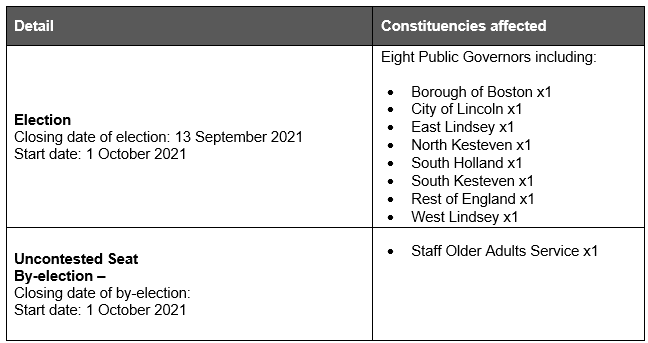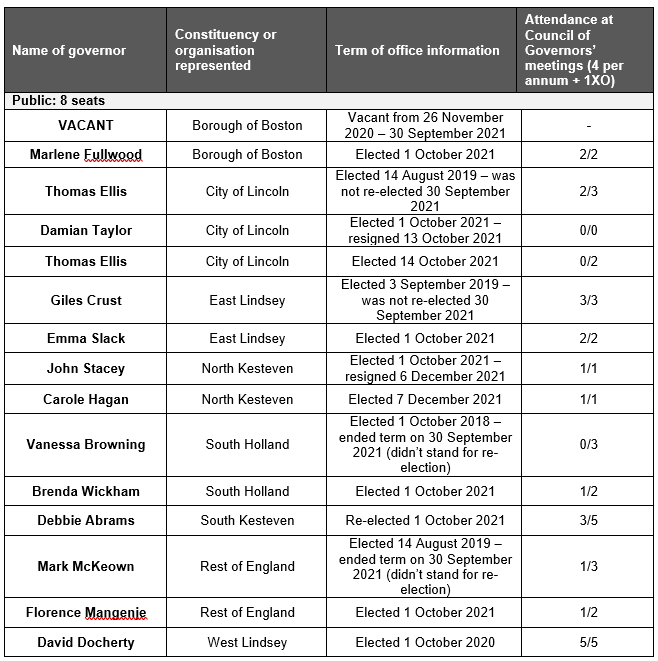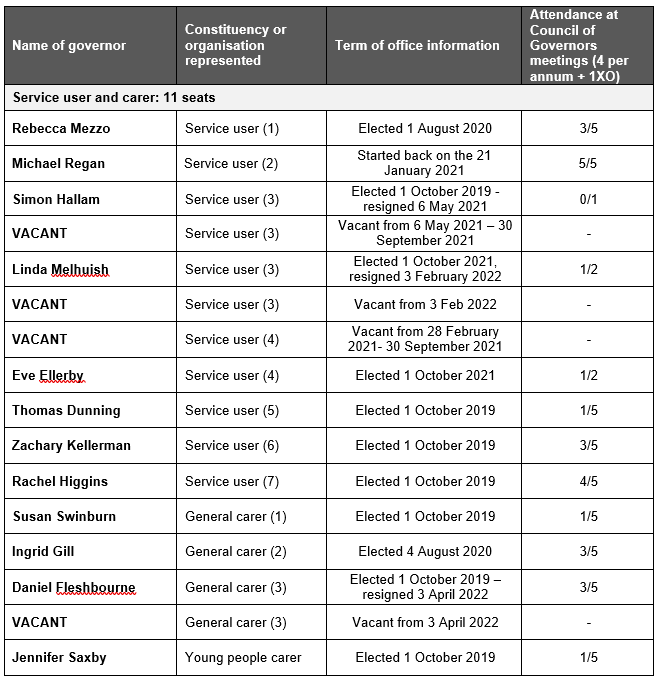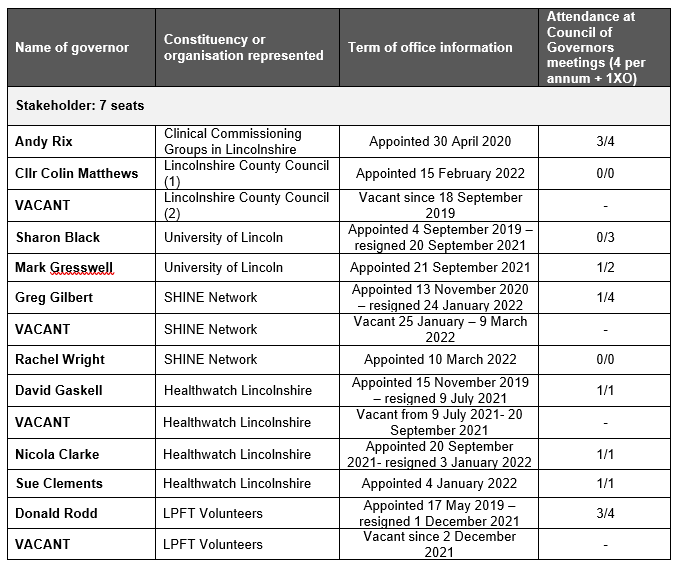NHS Foundation Trust Code of Governance
Lincolnshire Partnership NHS Trust was authorised as a foundation trust and became Lincolnshire Partnership NHS Foundation Trust on 1 October 2007. The existing services transferred to the Trust.
The Trust has applied the principles of the NHS Foundation Trust Code of Governance on a comply or explain basis. The NHS Foundation Trust Code of Governance is based on the principles of the UK Corporate Governance Code.
The Board of Directors has established governance policies in the light of the main and supporting principles of the Code of Governance; these are detailed on the Trust website www.lpft.nhs.uk.
The Board of Directors receives quarterly reports via the Audit Committee. This allows it to monitor compliance with governance arrangements and on an on-going basis to identify areas for further development. The Board Assurance Framework and the Trust’s governance arrangements are scrutinised by the Audit Committee before being considered by the Board to ensure compliance with the provisions of the Code of Governance for NHS Foundation Trusts and the NHS System Overview Framework.
Governance and constitutional powers
The Trust’s Constitution sets out the requirements of governance and in 2021/22 it was compliant with the NHS Foundation Trust Code of Governance. The Trust’s Constitution is supported by standing orders for the Board of Directors, standing orders for the Council of Governors and codes of conduct and responsibilities documents for each.
The Trust’s Constitution and standing orders set out the powers of both the Council of Governors and Board of Directors. These are further described in the standing financial instructions and scheme of delegation, all of which are publicly available on the Trust’s website
Register of interests
Governors and directors are required to, and have signed to say that they will, comply with their respective codes of conduct and declare any potential conflict of interest. Registers of interest are maintained of the governors’ and directors’ interests. These registers can be accessed on the Trust’s website, and copies can also be obtained by members of the public by writing to the Director of Corporate Governance at Trust headquarters.
Compliance with the Code of Governance
The NHS Foundation Trust Code of Governance has been applied to all clauses of the Trust’s Constitution. The processes to ensure a successful and constructive relationship between the directors and governors are set out in detail in Annex 8, section 2 of the Trust’s Constitution.
Care Quality Commission (CQC)
The Trust is required to register with the CQC and its current registration status is fully registered. The Trust has no conditions on registration.
The Trust has been registered to carry out the following regulated activities:
- Treatment of disease disorder or injury
- Assessment and medical treatment of persons detained under the Mental Health Act 1983
- Diagnostic and screening procedures
- We are not registered for personal care
The CQC ensures health and social care services provide people with safe, effective, compassionate, high quality care and they encourage care services to improve.
The CQC’s role is to monitor, inspect and regulate services to ensure they meet fundamental standards of quality and safety. They publish their findings, including performance ratings to help people choose care. They have a surveillance model which is built on a suite of indicators that relate to the five key questions inspectors ask all services – are they safe, effective, caring, responsive, and well-led?
The Trust had a comprehensive inspection in April 2017 and received an overall inspection rating of Good. This was a substantial improvement over the previous inspection in November 2015, with a particularly marked improvement in the safety domain from Inadequate to Good.
The inspection highlighted many examples of good practice. The Trust’s specialist community and adolescent mental health services (CAMHS) received an Outstanding rating for their commitment to young people and families. Community and inpatient services for adults of working age and learning disabilities services were rated as requiring improvements.
The Trust has robustly implemented an action plan to address those areas of further improvement; these are also linked to the Trust’s continuous quality improvement programme.
The Trust was then subject to a further core services inspection of some of its services and as Well-led review in November 2018. In January 2019 the Trust received its report showing a further improvement with all elements of all services inspected receiving a rating of Good or above. The Trust was rated overall Good with an Outstanding rating for Well-led. The reports are available on the CQC website.
In March 2020, the CQC inspected long stay/rehabilitation mental health wards for adults of working age. The report was received, and an action plan put in place and delivered through 2020/21. Key line of enquiry ‘are services well led’ was due to be inspected in March/April 2020 but due to the COVID-19 pandemic was postponed.
The Trust is also subject to periodic Mental Health Act (MHA) reviews by the CQC as a result of COVID-19 no inspections took place in 2020/21 but these were reinstated in 2021/22, initially these were virtual and have subsequently been reinstated as in-person inspections/visits. Any actions identified from the visits have been monitored and assurance given to the CQC on completion of these actions.

The Trust is fully compliant in respect of MHA visits and has promptly addressed any feedback and actions identified. CQC visit related action plans are monitored through the Trust’s operational governance group, with assurance reported to the Quality Committee.
The COVID-19 social distancing precautions as well as other priorities in managing the pandemic have curtailed the Trust’s usual programme of compliance assurance mechanisms in both 2020/21 2021/22. Including the 15 steps/mock CQC visits to clinical areas in both inpatient and community settings and, the Non-executive directors and directors scheduled and non-scheduled visits to clinical areas, these restarted in the last quarter of 2021/22. They were well received by staff, and have provided valuable triangulation of assurance.
Council of Governors
The Trust is accountable to its members and the wider public through a Council of Governors. Statutory responsibilities of the Council of Governors in 2021/22 have included:
- Holding the Board to account, via the non-executive directors, for the performance of the Trust.
- The appointment a new chair and two Non-Executive Directors (to Commence on 1 May 20221) and a further Non-Executive Director due to start on 1 May 2022 as well as determining the remuneration and allowances for these and existing NED appointments. This duty is performed via a Nominations and Remunerations (NOMs) Committee of the Council of Governors, which consists of seven governors and the Trust Chair (Where appropriate) as set out in the para 28.8 of Constitution of the Trust.
- Representing the members and wider public through a range of engagement events and stakeholder organisations, exclusively held online during 2021/22 to ensure compliance with COVID-19 restrictions.
- Representing the members and the wider public through the maintenance of an ideas, innovations and issues log (the iLog), managed via the Council of Governors’ Representation Committee.
- Providing their view to the Board of Directors on the Trust’s forward plans.
- Approving the performance indicators within the Quality Report.
The Council of Governors has a collective responsibility to disseminate information about the Trust, its vision and its performance to the constituents or organisations that appointed them. Equally the governors play a vital role in communicating the views and comments of the membership and the wider public to the Board of Directors to ensure that members contribute to the forward plans of the organisation. The Council of Governors’ agreed way of working for the year includes:
- Formal joint meetings with the Board of Directors to agree strategy.
- A Standards Committee to oversee codes of conduct and responsibilities.
- A Representation Committee to represent the membership and public and allow for detailed discussions on issues raised with the governors.
- Active participation in the recruitment of key staff.
- Active participation in external forums, such as Healthwatch Lincolnshire and clinical commissioning groups patient participation forums.
- Maintaining and developing an iLog to capture any process ideas, innovations and issues.
- Engaging online during the past year has enable the Council of Governors to continue to meet its statutory duties.
Further information regarding the work of these groups and committees and future plans for them can be found in the membership section of this report.
During 2021/22, the Council of Governors has met regularly using online technologies to discharge its duties and exercise its powers by:
- Holding the Board to account by receiving reports on the performance of the Trust.
- Receiving reports on the performance of the non-executive directors and approving the remuneration for the Chair and non-executive directors.
- Contributing to the preparation of the Trust’s strategies and forward plan.
- Receiving the Trust’s Annual Accounts from 2020/21.
- Representing the views and opinions of their respective constituents and the public.
- Undertaking training for their duties.
- Receiving and considering any other appropriate information required to enable it to discharge its duties.
The Council of Governors has a policy for engagement with the Board of Directors, (located in Annex 8, section 2 of the Constitution). This policy ensures that there is appropriate and effective interaction between the Council and the Board.
Led by the Chair, the Council of Governors annually assesses their collective performance using a formalised appraisal process. The Council regularly communicates to members and the public detailing how they have discharged their responsibilities through:
- public meetings
- updates
- announcements
on the Trust website, articles in the local and trade press, and through the Trust’s magazine, Better Together.
Trust Chair
The Trust Chair is responsible for leadership of both the Board of Directors and the Council of Governors. However, the governors have a responsibility to make the arrangements work and take the lead in inviting the Chief Executive to their meetings and inviting attendance by other executives and non-executives, as appropriate. The Chair ensures that the views of the governors and members are communicated to the Board as a whole.
Elected members
To become a member of the Council of Governors you must be over 16 years of age and a member of the Trust’s public, service user, carer or staff constituencies. Further eligibility criteria for governors are stated in the Trust’s Constitution which can be found on the Trust’s website.
Governors are required to declare any relevant interests which are then entered into the publicly available register of governors’ interests. This register is formally reviewed annually by the Council of Governors and is available on the Trust’s website.
A by-election and an election were both facilitated by the Electoral Reform Service. The details in relation to each are detailed in the following table:

Membership of the Council of Governors from 1 April 2021 to 31 March 2022 is set out in the tables below and changes to its membership due to an election and by-election are indicated:



There is a clear policy and a fair process agreed by the Council of Governors for the removal of any governor who consistently and unjustifiably fails to attend the meetings of the Council, or has an actual or potential conflict of interest which prevents the proper exercise of their duties. A Standards Committee is established to maintain this process.
Lead Governor
In line with the Foundation Trust Code of Governance, the Council of Governors elects one of the governors to be the Lead Governor. The main duties of the Lead Governor are to:
- Act as a point of contact for regulator should they wish to contact the Council of Governors on an issue for which the normal channels of communication are not appropriate.
- Be the conduit for raising with the regulator any governor concerns that the Trust is at risk of significantly breaching the terms of its licence, having made every attempt to resolve any such concerns locally.
- Chair such parts of meetings of the Council of Governors which cannot be chaired by the Trust Chair or Deputy Chair due to a conflict of interest in relation to the business being discussed.
The table below shows Lead and Deputy Governors arrangements for the year ending 31 March 2022:

Trust support for governors
All prospective governors are invited to a presentation to receive information on the role and its responsibilities. Newly elected governors receive a formal induction and a range of support materials to assist them in their new duties. Throughout their appointment, they are supported by a team of Trust staff to ensure they are kept up to date with any legislative changes that may affect their duties and powers to carry out their statutory duties.
This support includes:
- Joint Council of Governors and Board of Directors meetings to strengthen their relationship to make decisions together to enable the transparency of information.
- Access to the benefits of the Trust’s membership of NHS Providers which includes admission to national conferences, events such as the annual governor forum, training and online learning materials to further strengthen their knowledge.
- The provision of both in house and externally provided training identified through the Council of Governors’ appraisal processes and training needs analysis.
- Membership of external network facilitated by NHS providers and other bodies.
Expenses
Governors are entitled to claim reasonable expenses. However, because of the pandemic the majority of meetings in the year ending March 2022 have been held online. Only very few travel expenses have been incurred and claimed, and no other expenses have been claimed.

Training
The Trust has identified the required skill set to enable the governors to undertake their general duties to represent the membership and the wider public and to hold the Board to account via the non-executive directors. The importance of specific skill sets to enable governors to undertake recruiting, analyse data and understand reports is also recognised.
The governors’ training programme has been maintained with the needs of individual governors being identified through induction, training needs analysis, appraisal and informal routes.
The governors have had access to the Govern Well training and other conferences and workshops provided by NHS Providers.
Meetings
Meetings of the Council of Governors were held on a quarterly basis. All of the meetings, in this year have been held online to facilitate social distancing and COVID-19 precautions.
The Trust Chair chairs every meeting of the Council of Governors. Each meeting is open to scrutiny by members of the public, who have an opportunity to put questions to the Council. All meetings are advertised in advance through the local press, social media and on the Trust’s website. A recording of the meeting is also available on the Trust website.
The Council of Governors receives regular performance assurance reports from the Non-Executive Directors. The Council also receives updates from the Board of Directors and reports concerning Trust performance, finance and membership.
The governors can use their statutory duties to exercise their powers and challenge the Board of Directors when necessary.
Updates are also received at the Council of Governors’ meetings from the committees and groups that the governors are involved with. This involvement and other activities are detailed in the Trust’s magazine, Better Together, and on the Trust website. Governors attend a number of Trust and wider stakeholder events with members and the public, in 2021/22 this has been facilitated by the use of online technology and no face-to-face events have been attended. These forums provide the opportunity for members to raise ideas, innovations, inquiries and issues with governors which are recorded using the iLog. The iLog then forms a register and record of how ideas, innovations, involvement, and issues are directed within the Trust for consideration and resolution.
Contacting governors
Any member of the public wishing to make contact with a member of the Council of Governors or the Board of Directors can do so by:
- Corresponding in writing via the Governor and Membership Officer at Trust headquarters
- Through the Trust website
- Email lpft.
governor-member .@nhs.net

